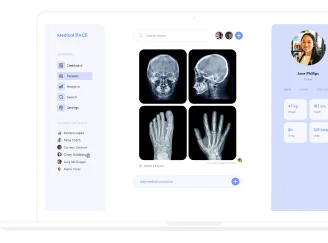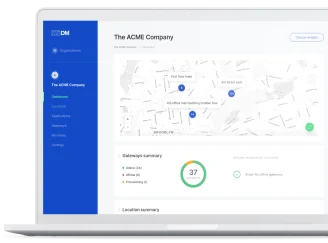DevOps consulting services
Adopt a DevOps culture and obtain the agility to meet new market demands.
-
Develop a customized DevOps strategy to streamline your IT processes
-
Choose suitable containerization, CI/CD, and testing approaches
-
Implement DevOps methodologies to optimize use of infrastructure resources and ensure cost-efficiency
-
Build a collaboration-driven development and operations team
-
Identify bottlenecks that slow down the release cycle
-
Adopt and configure DevOps tools that meet your business needs
DevOps consulting services at Yalantis
-
DevOps roadmap development
-
Get a thorough analysis of your current development, deployment, and release processes
-
Define which DevOps initiatives to follow
-
Prioritize the adoption of DevOps practices to align with your goals and objectives
-
-
DevOps process monitoring and management
-
Ensure continuous improvement, monitoring, and management of your DevOps processes
-
Get support or DevOps project recovery consulting to timely handle system bottlenecks
-
Transfer DevOps knowledge to your internal IT team to improve their efficiency
-
-
DevOps technology consulting
-
Choose DevOps technologies that best fit your needs
-
Use feasibility studies to validate your technology choices
-
Obtain an improvement roadmap with additional tools to further streamline DevOps infrastructure
-
Benefits of Yalantis DevOps consulting
-
01
Accelerated time-to-value
Expedite DevOps adoption in your organization with a custom DevOps implementation approach at every level of your IT infrastructure.
-
02
Focus on core business operations
Automate software delivery and enable efficient distribution of infrastructure resources to pay more attention to urgent business tasks and value-added services.
-
03
Continuous innovation
Drive a growth mindset at your company by implementing an array of modern DevOps methodologies, such as a maturity assessment framework.
-
04
Collaborative teams
Compose cross-functional development and operations teams that work together towards shared goals and improve overall business performance.
Speed up software delivery and improve IT operations
Adopt a tailored DevOps strategy and ensure tangible results such as quick and streamlined release cycles.
Our IT infrastructure works
Establish an efficient DevOps environment
Tap into the latest technologies to foster automated and effective software development and deployment.
Insights into Yalantis’ DevOps consulting services

Best practices for building and testing event-driven microservice architecture
Discover what is microservice architecture and how it is conceptually different from a monolith

Choosing a tech stack for the full-cycle web application development in 2023
What technology to use for web application development? We’ll share our experience and give you a detailed description of the technologies we use.

Code review: the importance for QA and development support
Code review is vital for app development. Find out how to code review via GitLab merge request, how to solve Error 500, and why code review is a must.
What DevOps practices and methodologies does your DevOps consulting team follow?
We follow a set of diverse industry-standard practices and methodologies to achieve consistency in the codebase and release software in a steady cycle. Our DevOps consulting experts implement continuous integration and continuous delivery (CI/CD) pipelines, which automate the build, test, and deployment stages of the software development lifecycle. By frequently integrating code review practices and code changes and automatically running tests, we can detect and address issues early on, reducing the likelihood of bugs reaching production.
Our DevOps consultants also emphasize infrastructure as code (IaC) principles, using tools like Terraform and Ansible to define and manage infrastructure in a version-controlled manner, which allows for tracking every code change.
We also actively employ modern containerization technologies (such as Docker) and common container orchestration platforms (such as Kubernetes). By containerizing applications and using container orchestration, we ensure portability, scalability, and efficient use of infrastructure resources.
What are the typical challenges organizations face when adopting DevOps, and how do you help overcome them with your DevOps consultancy?
One of the most typical challenges is a lack of understanding and conflicting workflows in the software development and operations teams due to different experience levels, backgrounds, and skills. It’s possible to handle this issue by establishing a single DevOps collaboration approach, with common development and deployment practices keeping teams on the same page.
Legacy systems and complex infrastructure can also pose challenges. Our DevOps consulting services team can assist organizations in identifying areas for modernization and implementing strategies such as gradual refactoring or containerization to incrementally improve infrastructure while minimizing disruption.
Another common challenge is selecting and integrating a toolchain. We offer expertise in evaluating and selecting appropriate tools and technologies that align with an organization’s specific needs and goals. Our team also assists in tool integration, configuration, and customization, ensuring seamless adoption of DevOps practices.
How does your DevOps consulting company help to efficiently maintain DevOps infrastructure?
Yalantis DevOps consulting services include maintenance of your existing DevOps infrastructure. Using a wide range of automated logging and monitoring tools, we enable real-time visibility into the health of your infrastructure as well as its performance and availability. Such measures help us promptly discern and resolve issues, minimizing system downtime and increasing system reliability.
Our DevOps consultants can also provide you with a robust version control system, such as Git, that allows for following branching and merging strategies to maintain a clean and manageable codebase and helps you streamline software development and deployment.
The Yalantis DevOps services team establishes test environments, allowing for accurate testing and validation of changes before deployment. We also maintain comprehensive and up-to-date documentation of your systems, processes, and configurations. This helps to onboard new team members, improves troubleshooting, and facilitates knowledge sharing.
What is the difference between a DevOps consultant and a DevOps engineer?
The roles of DevOps consultant and DevOps engineer at DevOps consulting companies differ in terms of their focus, responsibilities, and level of involvement in implementing DevOps practices.
A DevOps consultant is typically an external expert who assists an organization in effectively adopting and implementing DevOps practices. Their primary role is to provide strategic guidance and advice to the organization on how to improve their software development and operations processes. Thus, DevOps consultants are specialized advisors who help organizations develop and execute their DevOps transformation strategies.
A DevOps engineer is responsible for implementing and maintaining the tools, infrastructure, and processes required to support DevOps practices. DevOps engineers collaborate with development and operations teams to streamline and automate development and deployment workflows.
Measuring the success and effectiveness of DevOps initiatives: Yalantis’ approach during DevOps consultancy
Measuring the success and effectiveness of DevOps initiatives is essential for organizations to gauge their progress, identify areas for improvement, and demonstrate the value of their efforts. Below are several ways to measure DevOps success that Yalantis follows as a leading DevOps consulting company.
Defining DevOps success from a technological perspective
Deployment frequency. This metric focuses on how frequently deployments occur. High deployment frequency proves that a company can quickly deploy changes to the production environment. It showcases the agility and responsiveness of the development and deployment processes we pay attention to at our DevOps consulting firm.
Lead time. During a DevOps consultation, we also measure lead time, as it shows the time it takes for a change to move from code commit to production. Short lead times indicate efficient and streamlined continuous development processes, with faster feedback loops and reduced delays. If you decrease the lead time, you can speed up the release of your software and stay in tune with market demands.
Mean time to recovery (MTTR). This metric reveals the time needed for your software system to recover from incidents or sudden failures. A low MTTR indicates effective incident response, efficient troubleshooting, and quick issue resolution. By minimizing downtime and restoring services swiftly with the help of our DevOps support company, organizations can maintain high availability and customer satisfaction.
Change failure rate. Using this metric, you can track the number of deployments that lead to incidents or system failures. A lower change failure rate signifies higher quality and deployment stability. Aiming for a low change failure rate highlights the effectiveness of testing, automation, and quality assurance practices.
Automation metrics. During our DevOps consulting, you can measure the extent of automation within the software development and deployment processes. This can include metrics such as the percentage of automated tests, the degree of infrastructure provisioning automation, or the level of continuous integration and deployment automation. Higher automation rates demonstrate increased efficiency, reduced manual effort, and improved reliability.
Infrastructure utilization. Monitoring and measuring the use of infrastructure resources, such as servers, containers, or cloud instances, provide insights into resource efficiency. Optimized utilization ensures cost-effectiveness and scalability; it also avoids underutilization or overprovisioning.
Business-specific KPIs to measure
Customer satisfaction. After implementing your DevOps strategy, our DevOps services company can collect feedback from customers or end users, which is vital for understanding their satisfaction with the delivered software. Surveys, customer support interactions, or a net promoter score (NPS) can help to measure customer satisfaction. Positive feedback indicates that DevOps initiatives are meeting user expectations and delivering value.
Team collaboration. Assess the level of collaboration and communication among your development, operations, and other cross-functional teams as well as your DevOps consulting
team. You can assess the frequency of meetings, shared tools and dashboards, and cross-team feedback. High levels of collaboration indicate effective teamwork, reduced silos, and alignment towards shared objectives.
Compliance and security. We measure adherence to compliance requirements and the effectiveness of security controls as part of thorough DevOps consultancy. Metrics can include the number of security vulnerabilities identified and resolved or the percentage of security-related tests automated. High compliance and security levels demonstrate successful integration of these critical aspects into development and deployment practices.
How to define the impact of DevOps practices on your business
Evaluate the impact of DevOps initiatives on key business metrics and outcomes with the help of our DevOps support company. Areas that can be impacted include revenue growth, customer acquisition or retention rates, the time to market for new features or products, and overall business growth. Positive improvements in these areas demonstrate the value of DevOps to the organization and its ability to drive business success.
It is crucial to define specific metrics aligned with your organization’s goals and regularly track them to assess the success and effectiveness of DevOps initiatives. Yalantis DevOps consultants can assist you with continuous measurement and analysis, allowing for data-driven decision-making and continuous improvement of your organizations’ DevOps practices.



